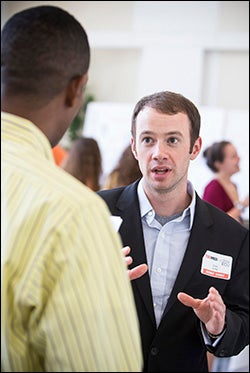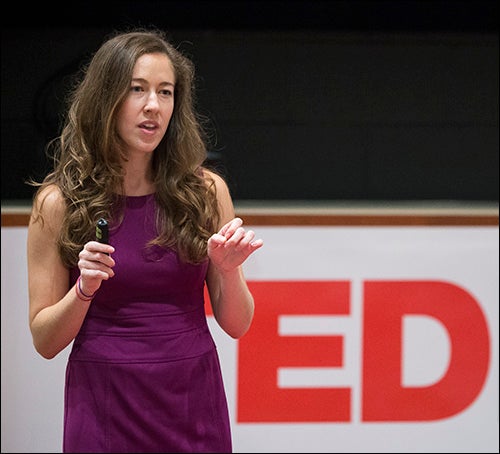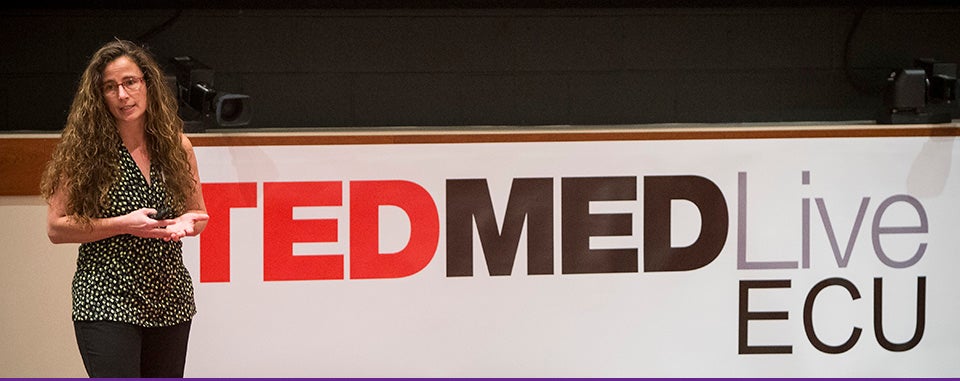TEDMED at ECU
Event encourages innovation, idea sharing in medicine
How much can be said about the state of health care in 18 minutes or less? You might be surprised. The nonprofit TED organization has devoted itself to spreading ideas in the form of short, powerful talks since the mid-1980s. TEDMED applies that concept to health care and medicine.
But more important than the talks are the discussions those brief presentations prompt, according to a group of students and faculty who replicated the live TEDMED environment at East Carolina University for the first time Sept. 13.

Hosts of TEDMEDLive at ECU David Holder, left, and Dylan Suttle talk during the event.
Dylan Suttle, a fourth-year medical student and president of the 2015 Brody School of Medicine class, first proposed the idea for TEDMEDLive at ECU. He attended a national TEDMED event in Washington, D.C., last fall and was inspired by the experience.
“The talks are the sideshow at the real event, (compared to) the collaboration, idea sharing and meeting people outside the talks themselves. I wanted to replicate that here,” he said.
“So much is going on here at ECU but no one has the chance to talk about it. We talk with the faculty, the physicians, but there’s always a wall there. This event breaks all those down.”
He sought help from fellow students, faculty and staff from Brody – and funding from regional partner Vidant Health – and the 150-seat event sold out within the first few weeks of registration.
“The spirit is fun collaboration and inspiration,” said Dr. David Holder, clinical associate professor of pediatrics at Brody and emcee for the Saturday event. “We want conversations.”
A series of eight talks streamed from national TEDMED events in Washington, D.C., and San Francisco provided enough fodder to get people started. Topics ranged from the relationship between drug addiction and neuroscience, to the need for transparency in how doctors are paid, to how intentional usage of light and sound can improve health care environments and healing.

Fourth-year Brody medical student Julie Barrett presented “Changing the Paradigm on Obesity” at the Sept. 13 event.
Tori Chapman, a nutrition science major and sophomore in ECU’s Honors College, was particularly struck by one patient’s tale about how a cocktail of multiple prescription drugs created a psychosis that was not present when she first went to the doctor.
“The power of her story makes you think differently,” Chapman said. “And that’s what TED is for. It’s encouraging to see there are people trying to change health care for the good.”
The most unique component of the ECU event was the inclusion of four “homegrown” speakers – men and women from ECU who want to start dialogues about topics of their own choosing. Suttle said organizers considered many impressive applicants, but only four were chosen.
- Dr. Daniel Goldberg, assistant professor in the Department of Bioethics and Interdisciplinary Studies, spoke about moving beyond “sick care” to implement social medicine and improve population health.
- Dr. Krista McCoy, assistant professor in the Department of Biology, shared frightening statistics about how environmental chemical exposure leads to endocrine disruption and childhood disease.
- Dr. Sam Sears, professor in the departments of psychology and cardiovascular sciences, explained that technology is enabling people to live longer, but asked whether they can be happy and feel secure in their health as they cope with chronic disease.
- Julie Barrett, a fourth-year medical student, urged the audience and physicians to stop blaming patients who are obese, examine the underlying science and partner with them instead of judging.
Suttle hopes the true impact of this event can be measured through future collaborations and innovations.
“I want to hear about research or some great development where someone says ‘this all started when we met at TEDMED.’”
For more information about the event, visit http://tedmedliveecu.org/.
